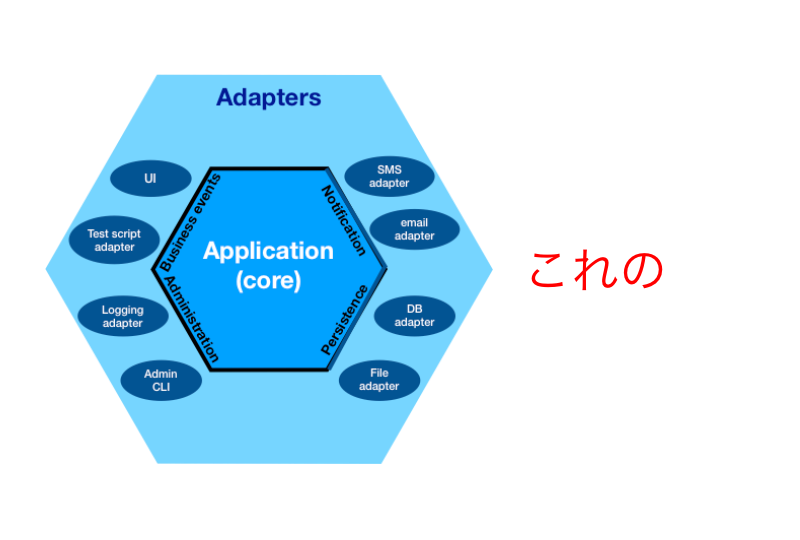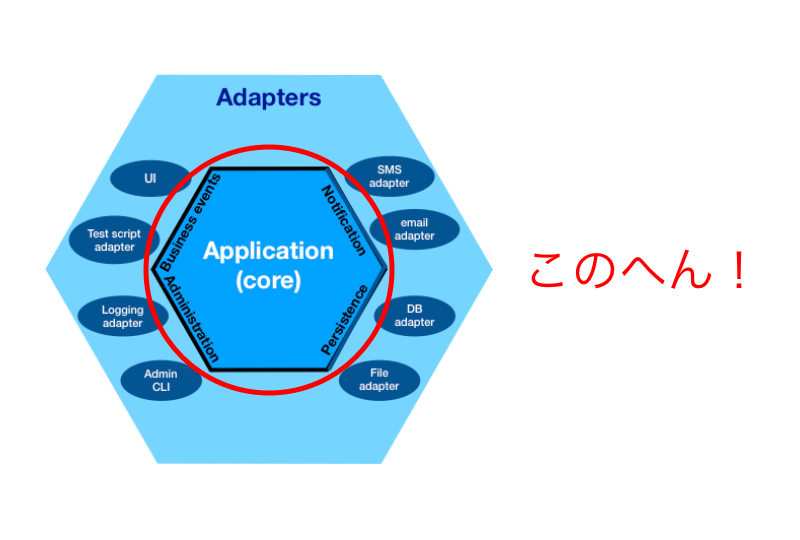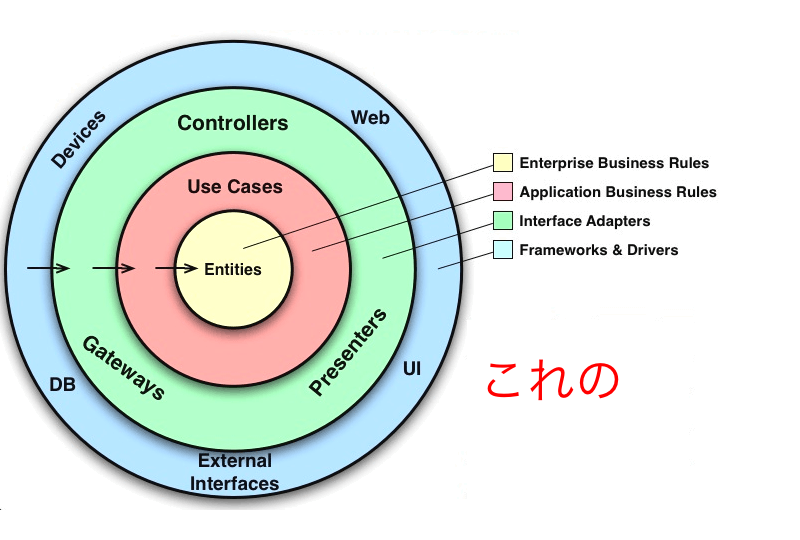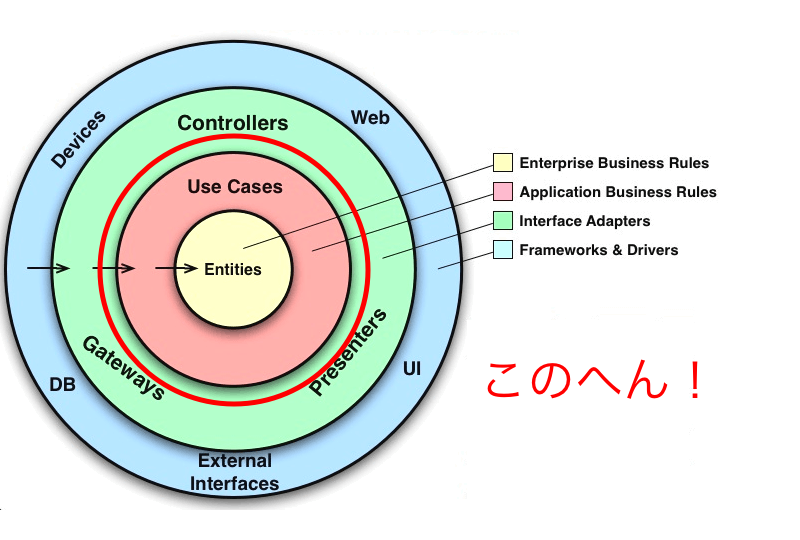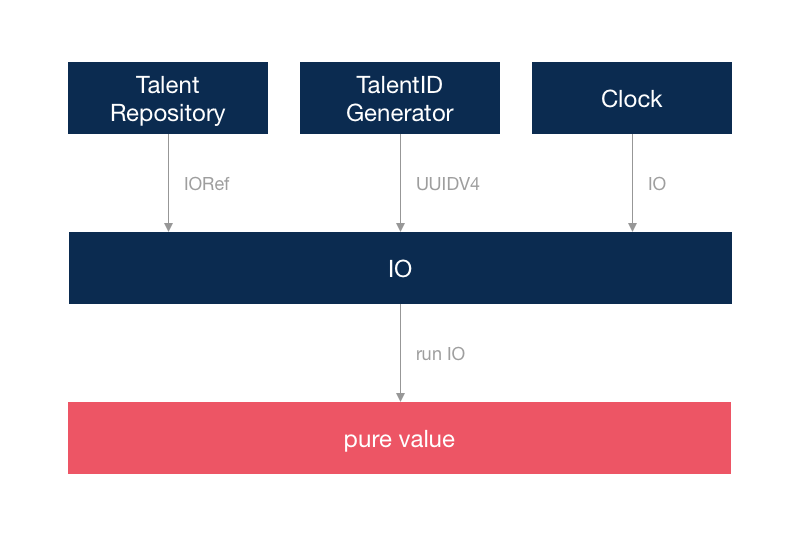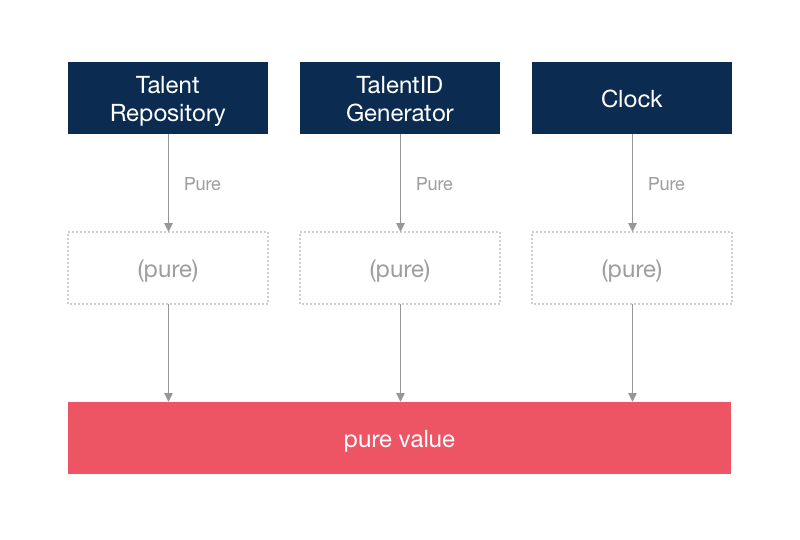自己紹介
- 亀岡 亮太 (Ryota Kameoka)
- 株式会社HERP リードエンジニア
- Twitter @ryotakameoka
- GitHub @ryota-ka
ToC
- ドメインロジックとは
- なぜドメインロジック記述が重要か?
- extensible effects
- ドメインロジックの記述
- ドメインロジックの実行
- ドメインロジックのテスト
注意事項
- スライドのコードはかなり端折ってます
ToC
- ドメインロジックとは
- なぜドメインロジック記述が重要か?
- extensible effects
- ドメインロジックの記述
- ドメインロジックの実行
- ドメインロジックのテスト
ドメインロジックとは
- コドメインロジックの双対
ドメインロジックとは
コドメインロジックの双対- ビジネスロジックとも呼ばれる
In computer software, business logic or domain logic is the part of the program that encodes the real-world business rules that determine how data can be created, stored, and changed.
https://en.wikipedia.org/wiki/Business_logic より引用
ドメインロジックとは
CC BY-SA 4.0
created by Cth027
https://en.wikipedia.org/wiki/Hexagonal_architecture_(software)#/media/File:Hexagonal_Architecture.svg
一部改変
ドメインロジックとは
CC BY-SA 4.0
created by Cth027
https://en.wikipedia.org/wiki/Hexagonal_architecture_(software)#/media/File:Hexagonal_Architecture.svg
一部改変
ドメインロジックとは
https://blog.cleancoder.com/uncle-bob/2012/08/13/the-clean-architecture.html より引用・一部改変
ドメインロジックとは
https://blog.cleancoder.com/uncle-bob/2012/08/13/the-clean-architecture.html より引用・一部改変
ToC
- ドメインロジックとは
- なぜドメインロジック記述が重要か?
- extensible effects
- ドメインロジックの記述
- ドメインロジックの実行
- ドメインロジックのテスト
なぜドメインロジック記述が重要か?
- 実装詳細に依存しない (抽象化の壁)
- 変更に強いコードベース
- 複雑性を減らす
どのようにドメインロジックを記述したいか?
- 関心の分離
- 拡張性
- 合成性
- テスタビリティ
ToC
- ドメインロジックとは
- なぜドメインロジック記述が重要か?
- extensible effects
- ドメインロジックの記述
- ドメインロジックの実行
- ドメインロジックのテスト
extensible effects
-
なんかいい感じのモナドの合成手法
- 複数の計算効果をなんかいい感じに混ぜることができる
- Kiselyov and Ishii (2015) "Freer Monads, More Extensible Effects" の スライドを15回ぐらい眺めるとわかる
- 複数の関心事を含んだ "プログラム" (monad) を上手く書ける
- 理論的背景や実装方法は本題じゃないので詳しくは懇親会で (誰かに聞いてください)
extensible effects
ざっくり言うと
- "プログラムそのもの" が書ける (free(r) monads)
- 型
f aを「関心事f :: Type -> Typeが付いた型a」と見る-
fによって写されている
-
- 複数の関心事を混ぜることができる
f, g, h :: Type -> Type
ToC
- ドメインロジックとは
- なぜドメインロジック記述が重要か?
- extensible effects
- ドメインロジックの記述
- ドメインロジックの実行
- ドメインロジックのテスト
例) 新しいタレントを追加する
addTalent ユースケース
タレント:
data Talent
= Talent
{ id :: TalentID -- ^ 'Text' の newtype
, name :: TalentName -- ^ 'Text' の newtype
, addedAt :: TalentAddedAt -- ^ 'UTCTime' の newtype
}
例) 新しいタレントを追加する
- タレント名を受け取る
- 現在時刻を取得する
- IDを発番する
- タレントを永続化する
- 作られたタレントを返す
例) 新しいタレントを追加する
- タレント名を受け取る (引数)
- 現在時刻を取得する
- IDを発番する
- タレントを永続化する
- 作られたタレントを返す (戻り値)
TalentName -> m Talent
例) 新しいタレントを追加する
- タレント名を受け取る
- 現在時刻を取得する (effect)
- IDを発番する (effect)
- タレントを永続化する (effect)
- 作られたタレントを返す
例) 新しいタレントを追加する
- タレント名を受け取る
-
現在時刻を取得する (
Clockeffect) -
IDを発番する (
TalentIDGeneratoreffect) -
タレントを永続化する (
TalentRepositoryeffect) - 作られたタレントを返す
名前をつけてやる (関心の分離)
Clock effect
出来合いの effect を使う
module Effects.Clock where
import Data.Extensible (ReaderEff)
import Data.Time (UTCTime)
type AnonEff = ReaderEff UTCTime
type HasEff effs = _
ask :: forall effs. HasEff effs => Eff effs UTCTime
ask = _
TalentIDGenerator effect
出来合いの effect を使う
module Effects.TalentIDGenerator where
import Data.Extensible (ReaderEff)
import DomainObjects.Talent (TalentID)
type AnonEff = ReaderEff TalentID
type HasEff effs = _
next :: forall effs. HasEff effs => Eff effs TalentID
next = _
TalentRepository effect
自分で effect を定義する
module Effects.TalentRepository where
type AnonEff = TalentRepository
type HasEff effs = _
data TalentRepository a where
Find :: TalentID -> TalentRepository (Maybe Talent)
Store :: Talent -> TalentRepository ()
find :: forall effs. HasEff effs => TalentID -> Eff effs (Maybe Talent)
find talentID = _
store :: forall effs. HasEff effs => Talent -> Eff effs ()
store talent = _
addTalent ユースケース
addTalent
:: forall effs
. ( Clock.HasEff effs
, TalentIDGenerator.HasEff effs
, TalentRepository.HasEff effs
)
=> TalentName
-> Eff effs Talent
addTalent name = do -- タレント名を受け取る
例) 新しいタレントを追加する
addTalent
:: forall effs
. ( Clock.HasEff effs
, TalentIDGenerator.HasEff effs
, TalentRepository.HasEff effs
)
=> TalentName
-> Eff effs Talent
addTalent name = do -- タレント名を受け取る
now <- Clock.ask -- 現在時刻を取得する
例) 新しいタレントを追加する
addTalent
:: forall effs
. ( Clock.HasEff effs
, TalentIDGenerator.HasEff effs
, TalentRepository.HasEff effs
)
=> TalentName
-> Eff effs Talent
addTalent name = do -- タレント名を受け取る
now <- Clock.ask -- 現在時刻を取得する
id <- TalentIDGenerator.next -- IDを発番する
例) 新しいタレントを追加する
addTalent
:: forall effs
. ( Clock.HasEff effs
, TalentIDGenerator.HasEff effs
, TalentRepository.HasEff effs
)
=> TalentName
-> Eff effs Talent
addTalent name = do -- タレント名を受け取る
now <- Clock.ask -- 現在時刻を取得する
id <- TalentIDGenerator.next -- IDを発番する
let addedAt = TalentAddedAt.fromUTCTime now
talent = Talent { id, name, addedAt }
例) 新しいタレントを追加する
addTalent
:: forall effs
. ( Clock.HasEff effs
, TalentIDGenerator.HasEff effs
, TalentRepository.HasEff effs
)
=> TalentName
-> Eff effs Talent
addTalent name = do -- タレント名を受け取る
now <- Clock.ask -- 現在時刻を取得する
id <- TalentIDGenerator.next -- IDを発番する
let addedAt = TalentAddedAt.fromUTCTime now
talent = Talent { id, name, addedAt }
TalentRepository.store talent -- タレントを永続化する
例) 新しいタレントを追加する
addTalent
:: forall effs
. ( Clock.HasEff effs
, TalentIDGenerator.HasEff effs
, TalentRepository.HasEff effs
)
=> TalentName
-> Eff effs Talent
addTalent name = do -- タレント名を受け取る
now <- Clock.ask -- 現在時刻を取得する
id <- TalentIDGenerator.next -- IDを発番する
let addedAt = TalentAddedAt.fromUTCTime now
talent = Talent { id, name, addedAt }
TalentRepository.store talent -- タレントを永続化する
pure talent -- 作られたタレントを返す
何をやっているのかがわかる!!
ToC
- ドメインロジックとは
- なぜドメインロジック記述が重要か?
- extensible effects
- ドメインロジックの記述
- ドメインロジックの実行
- ドメインロジックのテスト
ドメインロジックの実行
- タレント名を受け取る
-
現在時刻を取得する (
Clockeffect) -
IDを発番する (
TalentIDGeneratoreffect) -
タレントを永続化する (
TalentRepositoryeffect) - 作られたタレントを返す
3つの effect を handle すればユースケースを"実行"できる
作戦会議
-
Clockeffect- システム・コールで現在時刻を取得する
-
IOっぽい
-
- システム・コールで現在時刻を取得する
-
TalentIDGeneratoreffect- IDを発番する (UUID v4 とかで)
-
IOっぽい
-
- IDを発番する (UUID v4 とかで)
-
TalentRepositoryeffect- タレントを永続化する
- ホンマは RDB に入れたいけど今日のところは
IORefで勘弁しといたるか……-
IOっぽい
-
- ホンマは RDB に入れたいけど今日のところは
- タレントを永続化する
作戦会議
-
Clockeffect- システム・コールで現在時刻を取得する
-
IOっぽい
-
- システム・コールで現在時刻を取得する
-
TalentIDGeneratoreffect- IDを発番する (UUID v4 とかで)
-
IOっぽい
-
- IDを発番する (UUID v4 とかで)
-
TalentRepositoryeffect- タレントを永続化する
- ホンマは RDB に入れたいけど今日のところは
IORefで勘弁しといたるか……-
IOっぽい
-
- ホンマは RDB に入れたいけど今日のところは
- タレントを永続化する
→ 一旦それぞれ IO に押し付けてあとでまとめて解決するか
作戦会議
Clock effect を handle する
run
:: forall effs a
. IO.HasEff effs -- 残りの effects に IO が含まれていることを要求
=> Eff (Clock.NamedEff ': effs) a -- Clock effect を剥がす
-> Eff effs a
run = peelEff0 pure interpret
where
interpret
:: forall r
. Clock.AnonEff r
-> (r -> Eff effs a)
-> Eff effs a
interpret Refl k = do
now <- IO.lift getCurrentTime -- IO に押し付ける
k now
TalentIDGenerator effect を handle する
run
:: forall effs a
. IO.HasEff effs -- 残りの effects に IO が含まれていることを要求
=> Eff (TalentIDGenerator.NamedEff ': effs) a -- TalentIDGenerator effect を剥がす
-> Eff effs a
run = peelEff0 pure interpret
where
interpret
:: forall r
. TalentIDGenerator.AnonEff r
-> (r -> Eff effs a)
-> Eff effs a
interpret Refl k = do
uuid <- IO.lift UUID.nextRandom -- IO に押し付ける
let text = UUID.toText uuid
talentID = TalentID.shamefullyConvertFromText text
k talentID
TalentRepository effect を handle する
run
:: forall effs a
. IO.HasEff effs
=> IORef (Map Talent.ID Talent)
-> Eff (TalentRepository.NamedEff ': effs) a
-> Eff effs a
run ref effs = peelEff0 pure interpret effs
where
interpret :: forall r . TalentRepository.AnonEff r -> (r -> Eff effs a) -> Eff effs a
interpret (Find id) k = do
repo <- IO.lift $ readIORef ref
let mtalent = Map.lookup id repo
k mtalent
interpret (Store talent@Talent { id }) k = do
IO.lift $ atomicModifyIORef' ref (\repo -> (Map.insert id talent repo, ()))
k ()
Webサーバから呼び出す
run :: IO ()
run = do
talentRepo <- newIORef mempty
let runUseCase
:: forall a
. Eff '[TalentRepository.NamedEff, TalentIDGenerator.NamedEff, Clock.NamedEff, IO.NamedEff] a
-> IO a
runUseCase = retractEff . Clock.run . TalentIDGenerator.run . TalentRepository.run talentRepo
scotty 3000 $ do
-- タレントの数を返す
get "/talents.count" $ do
repo <- liftIO $ readIORef talentRepo
let count = length repo
json $ object ["count" .= count]
-- タレントを追加する
post "/talents.add" $ do
name <- param "name"
_ <- liftIO . runUseCase $ do -- use case 呼び出し
addTalent (TalentName.shamefullyConvertFromText name)
status status201
json $ object ["ok" .= True]
$ curl -X GET localhost:3000/talents.count
{"count":0}%
$ curl -X POST -d name=Alice localhost:3000/talents.add
{"ok":true}%
$ curl -X POST -d name=Bob localhost:3000/talents.add
{"ok":true}%
$ curl -X GET localhost:3000/talents.count
{"count":2}%
ToC
- ドメインロジックとは
- なぜドメインロジック記述が重要か?
- extensible effects
- ドメインロジックの記述
- ドメインロジックの実行
- ドメインロジックのテスト
ドメインロジックのテスト
- このようにして記述したドメインロジックは容易にテスト可能
- 副作用を起こさずに pure に handle する
作戦会議
Clock を pure に handle する
run
:: forall effs a
. UTCTime
-> Eff (Clock.NamedEff ': effs) a
-> Eff effs a
run = flip runReaderEff
普通に Reader
TalentIDGenerator を pure に handle する
run
:: forall effs a
. Eff (TalentIDGenerator.NamedEff ': effs) a
-> Eff effs a
run effs = peelEff1 (\x _ -> pure x) interpret effs 0
where
interpret :: forall r . TalentIDGenerator.AnonEff r -> (r -> Integer -> Eff effs a) -> Integer -> Eff effs a
interpret Refl k n = do
let text = T.pack (show n)
talentID = TalentID.shamefullyConvertFromText text
k talentID (n + 1)
TalentID "0"TalentID "1"TalentID "2"- ...
を順に生成
TalentRepository を pure に handle する
run
:: forall effs a
. Map Talent.ID Talent
-> Eff (TalentRepository.NamedEff ': effs) a
-> Eff effs (a, Map Talent.ID Talent)
run initState effs = peelEff1 (\a s -> pure (a, s)) interpret effs initState
where
interpret
:: forall r
. TalentRepository.AnonEff r
-> (r -> Map Talent.ID Talent -> Eff effs (a, Map Talent.ID Talent))
-> Map Talent.ID Talent
-> Eff effs (a, Map Talent.ID Talent)
interpret (Find id) k repo = k (Map.lookup id repo) repo
interpret (Store talent@Talent { id }) k repo =
let repo' = Map.insert id talent repo
in k () repo'
テストコード
pure な handler でユースケースを実行
now :: UTCTime
now = posixSecondsToUTCTime 1234567890
runUseCase
:: Eff '[TalentRepository.NamedEff, TalentIDGenerator.NamedEff, Clock.NamedEff] a -> (a, Map Talent.ID Talent)
runUseCase = leaveEff . Clock.run now . TalentIDGenerator.run . TalentRepository.run mempty
spec :: Spec
spec = describe "addTalent" $ do
it "increments the number of talents in the repository" $ do
let name = TalentName.shamefullyConvertFromText "John Doe"
(_, repo) = runUseCase $ addTalent name
length repo `shouldBe` 1
ユースケースのテスト
$ stack test use-cases:test:spec
use-cases> test (suite: spec)
UseCases.AddTalent
addTalent
increments the number of talents in the repository
Finished in 0.0003 seconds
1 example, 0 failures
use-cases> Test suite spec passed
まとめ
extensible effects でロメインロジックを記述すると何が嬉しいか?
-
関心の分離
- effect を個別に定義できる
-
拡張性
- 新たな effect に対して開かれている (open union)
-
合成性
- monadic に合成可能
-
テスタビリティ
- pure に実行可能
